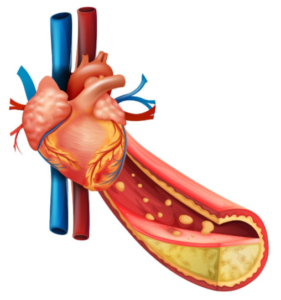Your chest pain may be irritable bowel syndrome—you HOPE, since you’re also fearing it’s related to your heart.
If you have IBS and one day you get chest pain, this doesn’t mean it’s from your irritable bowel, yet it also doesn’t mean it’s from your heart, either (e.g., could be a muscle strain).
Just how much overlap is there between the symptoms of IBS and a heart problem?
If you’ve been diagnosed with IBS and have new-onset chest pain or some kind of aching in that area, then gee, this sure is scary, no matter how much you try to convince yourself, “It must be my IBS.”
The Courage to See a Cardiologist
“Chest pain is a common disorder that can affect men [and women] of all ages,” says Dr. Brian Lacy, MD, of Dartmouth Hitchcock Med Center, who specializes in functional disorders of the gastrointestinal tract and author of “Making Sense of IBS.”
“The first step in the diagnosis of chest pain is to determine whether it is cardiac in origin (from the heart) or from another organ system.
“This is obviously critical, as chest pain from the heart will be treated very differently than chest pain from chest wall muscles or the ribs.”
IBS Chest Pain Symptoms Compared to a Heart Problem
Dr. Lacy explains, “Chest pain that is cardiac in origin is often (but not always, and that’s the hooker here) associated with an elevated pulse (tachycardia), shortness of breath, diaphoresis (sweatiness) with pain that radiates from the chest into the neck and left arm.
“Chest pain that originates from the esophagus or stomach is usually underneath the sternum or in the epigastric region, does not radiate to the neck or left arm, and is unlikely to be associated with diaphoresis or shortness of breath.”
Note that both heart attack pain and gastroesophageal reflux disease (which originates from the esophagus) can cause pain in the back, but irritable bowel syndrome does not.
“IBS, which is often associated with spasms of the colon or small intestine, can cause chest pain in some individuals,” says Dr. Lacy.
“It is easy to understand how a patient with IBS, who has spasms in the colon or small intestine, might also have spasms in another part of the GI tract such as the esophagus.”
Cardiac Issue
Angina is chest pain resulting from insufficient blood flow in the heart, caused by obstructed coronary arteries.

Source: vecteezy.com
A key difference between angina chest pain and that from IBS is that, in the case of stable angina, the discomfort will arise only during physical exertion or periods of intense emotion.
Sometimes the exertion is merely that of walking up a single flight of stairs.
Pain in the chest from IBS will not come from physical exertion or be associated with exercise or highly charged emotions.
However, things get very tricky with unstable angina. In this case, the chest pain can come during sedentary periods, even during sleep, awakening the person.
Unstable angina that’s caused by clogged arteries is an urgent situation, meaning that a heart attack can occur at any time.
We don’t want to get to a point of, “Is it IBS or unstable angina?”
What about how these different chest pains feel?
The sensation that arises during a heart attack may be quite severe – more so than any pain stemming from irritable bowel syndrome or even angina.
However, not all heart attacks present with severe chest pain. The discomfort may only be mild or dull.
IBS chest pain will never be severe, crushing (like a heavy weight is there) or have a feeling of constriction or tightness.
But remember, not all heart attack or angina sensations have these features, either.
“One approach that many health care providers take to try to determine whether chest pain is cardiac in origin or from another organ system (such as the esophagus) is to ask the patient about risk factors for heart disease,” says Dr. Lacy.
“Thus, an obese man [or woman] in his 60s or 70s who smokes cigarettes, has diabetes, has high blood pressure and elevated cholesterol, is at a much higher risk to have heart disease than a man in his 30s who is lean, does not smoke and does not have diabetes, elevated cholesterol or high blood pressure.
“Conversely, a younger man [or woman] with known IBS and intermittent spasms and cramps of the intestinal tract is more likely to have a spastic disorder of the esophagus (and thus chest pain) than a man who does not have IBS.”
If you’re worried your chest pain might be heart related, it’s time to see a cardiologist, who may recommend a cardiac stress test.
Additionally, for those suffering from IBS-C/CIC, you may want to try LINZESS® , and for IBS-D, Viberzi®, as these are very effective medications recommended by Dr. Lacy.
 Dr. Lacy combines his love of science, medicine and people to uncover the causes of symptoms like stomach pain, gas, bloating, diarrhea, constipation and regurgitation.
Dr. Lacy combines his love of science, medicine and people to uncover the causes of symptoms like stomach pain, gas, bloating, diarrhea, constipation and regurgitation.
 Lorra Garrick has been covering medical, fitness and cybersecurity topics for many years, having written thousands of articles for print magazines and websites, including as a ghostwriter. She’s also a former ACE-certified personal trainer.
Lorra Garrick has been covering medical, fitness and cybersecurity topics for many years, having written thousands of articles for print magazines and websites, including as a ghostwriter. She’s also a former ACE-certified personal trainer.
.


























